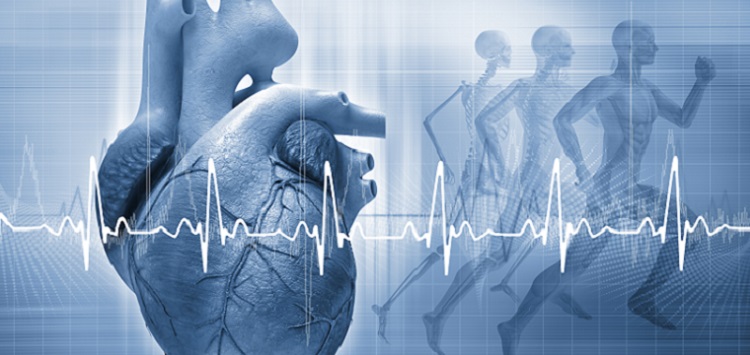The science behind stress and cardiovascular health from Dr Garcia’s perspective
The science behind stress and cardiovascular health from Dr Garcia’s perspective
Blog Article
Understanding the Significance of Cardiology in Modern Health Care Services
Cardiology plays an important function in contemporary health care, especially as heart problem proceeds to be the leading root cause of death worldwide. Advances in diagnostics and therapy have actually changed person treatment, making it possible for earlier interventions and improved outcomes. Furthermore, the shift towards preventive cardiology empowers individuals to manage their wellness proactively. As innovation remains to evolve, the assimilation of innovative remedies might better redefine cardiology's influence on public wellness, prompting a more detailed assessment of arising patterns and their ramifications.
The Prevalence of Heart Problem and Its Effect On Public Wellness
Although heart problem stays the leading cause of death worldwide, its impact extends much past private clients to impact public wellness systems and economies. The high frequency of cardiovascular disease places a substantial stress on health care sources, necessitating raised financing for rehab, treatment, and prevention programs. Public wellness efforts have to deal with danger elements such as excessive weight, smoking cigarettes, and sedentary way of lives, which add significantly to the climbing occurrence of heart conditions.Moreover, the financial worry connected with cardiovascular disease is enormous, incorporating not just straight medical expenses yet also indirect expenditures associated with lost efficiency and early mortality. Neighborhoods deal with obstacles in taking care of these prices, typically causing differences in medical care access and results. As the populace ages and lifestyle-related threats remain to escalate, the urgency for efficient cardiology interventions ends up being extremely important. Attending to heart illness is not just an issue of private health and wellness however likewise an important public wellness top priority.
Developments in Heart Diagnostics and Imaging Techniques
Current improvements in cardiac diagnostics and imaging methods have transformed the field of cardiology, enhancing the ability to detect and monitor heart problem. Strategies such as heart MRI, CT angiography, and echocardiography have actually come to be progressively innovative, providing in-depth pictures of cardiac structures and features. These techniques permit the early identification of problems like coronary artery illness, heart failing, and valvular disorders.Moreover, improvements in non-invasive diagnostics, such as wearable modern technology and remote monitoring tools, have empowered individuals and doctor. These tools promote real-time monitoring of heart rhythms and various other necessary signs, leading to timely treatments. Additionally, fabricated knowledge is being integrated right into imaging evaluation, boosting precision and effectiveness in medical diagnosis.
Advancements in Therapy Options for Heart Conditions
Recent improvements in cardiology have resulted in considerable developments in therapy alternatives for heart problems. These include innovative medical techniques that improve step-by-step end results and arising medications that offer brand-new avenues for therapy. As the area develops, these innovations play an important function in boosting person treatment and end results.
Advanced Surgical Techniques
Advancements in medical strategies have actually changed the landscape of cardiology, providing brand-new wish for patients with heart problems. Minimally intrusive treatments, such as catheter-based interventions, have greatly decreased healing times and hospital remains. Methods like robotic-assisted surgical procedure enhance precision, enabling doctors to navigate complex anatomical structures with higher precision. In addition, advancements in imaging innovation assist in real-time visualization throughout treatments, boosting end results. Transcatheter aortic shutoff substitute (TAVR) exhibits a development in dealing with aortic constriction, allowing valve replacement without open-heart surgery. In addition, hybrid approaches that combine medical and catheter-based approaches supply customized options for different cardiac issues. These advanced medical strategies not just enhance patient safety and security yet additionally broaden treatment options, highlighting the crucial role of technology in modern cardiology practices.
Arising Medicines and Therapies
As the landscape of cardiology remains to advance, arising treatments and medicines play an essential role in enhancing treatment options for heart disease. Advancements such as novel anticoagulants and progressed lipid-lowering representatives have changed the management of cardio illness, greatly lowering client morbidity and mortality. Additionally, the growth of gene treatments and regenerative medicine offers appealing avenues for dealing with conditions formerly deemed permanent. Professional trials are consistently exposing the efficiency of these therapies, pushing the borders of traditional treatments. The combination of electronic health and wellness innovations helps with individualized medicine, enabling for tailored treatment strategies based on genetic and way of life aspects. Collectively, these improvements emphasize the dynamic nature of cardiology, improving individual end results and redefining standards of care in contemporary health care.
The Duty of Preventive Cardiology in Patient Care
Precautionary cardiology plays a crucial role in patient care by focusing on the identification of risk elements that contribute to heart illness. Via lifestyle modification techniques and early detection methods, health care suppliers can properly reduce the incidence of cardio occasions - Cardiology Jupiter. This positive method not only improves individual outcomes but also advertises lasting health and wellness
Danger Element Identification
While cardio diseases continue to be a leading source of morbidity and mortality worldwide, reliable threat factor recognition works as a keystone of precautionary cardiology. Determining risk factors such as high blood pressure, hyperlipidemia, diabetic issues, and family history is essential for very early intervention. Healthcare professionals make use of various evaluating techniques to assess these variables, enabling tailored safety nets. Additionally, comprehending a patient's way of living choices, such as cigarette smoking and physical lack of exercise, better informs threat assessments. This extensive evaluation allows clinicians to create customized treatment plans focused on mitigating threats. By prioritizing threat element recognition, healthcare systems can improve person results and reduce the general worry of heart diseases, ultimately adding to improved public health methods and source allowance.
Way Of Living Adjustment Techniques
A wide variety of researches highlights the crucial role of way of living adjustment methods in reducing cardiovascular disease threat. These approaches encompass dietary adjustments, raised physical activity, cigarette smoking cessation, and weight administration. By taking on a heart-healthy diet regimen abundant in fruits, vegetables, whole grains, and lean proteins, individuals can lower cholesterol levels and blood stress. Normal physical task reinforces the heart and enhances overall cardiovascular health. In addition, giving up smoking cigarettes substantially minimizes the danger of cardiovascular disease and improves healing prices for those with present problems. Weight monitoring additionally adds to cardiovascular health by minimizing various other danger factors such as diabetes and high blood pressure. Carrying out these way of life changes not only promotes specific wellness but also acts as a keystone of preventive cardiology in person treatment.
Early Discovery Methods
Way of life alterations significantly add to decreasing cardiovascular disease threats, however they are most effective when paired with very early detection techniques. Preventative cardiology stresses the significance of recognizing possible heart problems before they rise into significant conditions. Techniques such as high blood pressure surveillance, cholesterol screening, and progressed imaging innovations like echocardiograms play important roles in assessing cardio wellness. Biomarkers and genetic screening additionally enhance the accuracy of early discovery, enabling tailored precautionary techniques. Normal cardiac threat assessments encourage doctor to interfere proactively, potentially protecting against cardiac arrest and strokes (Cardiology care). By incorporating these early discovery techniques right into regular care, clients can benefit from prompt lifestyle treatments and targeted therapies, inevitably enhancing and boosting outcomes high quality of life
Integrating Innovation Into Cardiology Practices
As visit the website improvements in technology continue to improve various fields, the assimilation of innovative devices and systems into cardiology techniques has actually come to be essential for boosting patient care and results. Telemedicine systems allow cardiologists to monitor clients from another location, boosting accessibility to care while reducing the burden on healthcare facilities. Wearable devices, such as smartwatches, allow constant heart price surveillance, signaling both patients and physicians to possible problems in real-time. Furthermore, expert system (AI) is being made use of to assess vast quantities of heart data, assisting in early medical diagnosis and personalized treatment plans. Advanced imaging strategies, consisting of 3D echocardiography, boost visualization of heart frameworks, bring about extra specific treatments. Digital wellness documents (EHRs) simplify client information monitoring, making sure that cardiologists have prompt accessibility to vital information. Together, these technological innovations are transforming cardiology, advertising aggressive administration and boosted wellness outcomes for people with cardiovascular problems.
The Significance of Individual Education and Involvement
Individual education and engagement play a crucial function in the monitoring of cardiovascular health. By furnishing individuals with expertise regarding their problems, treatment options, and way of living adjustments, medical care companies empower people to take an active function in their treatment. This proactive method can bring about improved adherence to recommended drugs, dietary modifications, and workout regimens, eventually lowering the risk of complications.Engagement likewise promotes a solid patient-provider relationship, motivating open communication and trust. When patients feel informed and entailed, they are most likely to voice concerns and ask concerns, which can bring about far better medical results. In addition, educational resources, such as workshops or digital platforms, can improve understanding and promote self-management methods. On the whole, focusing on patient education and engagement is vital for boosting cardio wellness, boosting lifestyle, and lowering healthcare costs connected with heart diseases.
Future Patterns in Cardiology and Their Potential Impact

Frequently Asked Questions
What Lifestyle Modifications Can Decrease Heart Problem Threat?
The present question addresses way of living adjustments that can greatly decrease cardiovascular disease threat. Cardiology Jupiter. Embracing a well balanced diet regimen, participating in regular exercise, keeping a healthy and balanced weight, handling tension, and avoiding tobacco can especially enhance cardiovascular wellness
Exactly How Can I Identify Very Early Indications of Heart Issues?
Acknowledging very early indicators of heart troubles involves surveillance signs such as chest discomfort, shortness of breath, tiredness, and irregular heart beat. Timely recognition of these signs can prompt essential medical assessment and treatment for far better outcomes.
What Are the Distinctions Between Cardiologists and Heart Surgeons?
The distinctions between cardiologists and heart cosmetic surgeons exist in their duties; cardiologists mainly detect and manage heart conditions via non-invasive methods, while cardiac doctors carry out operations to fix architectural heart issues. Each plays an important, distinct function.

Exactly how Often Should I Obtain My Heart Health Checked?
The frequency of heart medical examination varies based upon specific threat factors. Generally, adults ought to undergo assessments each to two years, while those with existing problems might need more frequent evaluations as encouraged by healthcare professionals.
What Function Does Genes Play in Cardiovascular Disease Risk?
Genetics greatly affects cardiovascular disease risk, with domestic patterns indicating inherited problems. additional hints Details genetics can predispose individuals to hypertension, cholesterol problems, and other cardiovascular issues, highlighting the importance of hereditary screening in assessing heart health. Heart disease continues to be the leading cause of death worldwide, its impact expands far past private people to affect public wellness systems and economies. Public health initiatives should deal with danger aspects such as obesity, smoking cigarettes, and sedentary way of lives, which add considerably Visit This Link to the increasing incidence of heart conditions.Moreover, the economic burden associated with heart disease is tremendous, including not only straight medical expenses but additionally indirect costs related to shed productivity and early mortality. Precautionary cardiology plays an important duty in patient care by focusing on the recognition of threat variables that contribute to heart disease. Synthetic knowledge (AI) and equipment understanding are enhancing diagnostics and client tracking, allowing very early discovery of heart conditions. The differences between cardiologists and heart surgeons lie in their duties; cardiologists primarily diagnose and manage heart conditions through non-invasive methods, while cardiac surgeons perform surgical procedures to correct architectural heart concerns.
Report this page